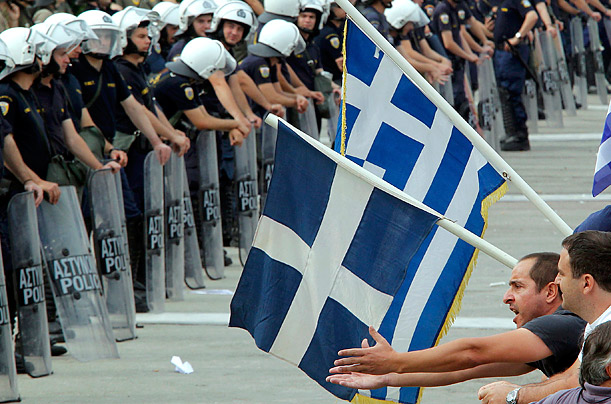Today marks 50 years since the coup that started the military junta in Greece. The anniversary has received almost no international coverage. This was a brutal fascist dictatorship that continues to resonate in Greek politics and society today.
On 21st April 1967, a group of colonels headed by George Papadopoulos seized power in a coup. Military units were mobilised and state buildings were seized. A series of political arrests marked the beginning of seven years of a brutal military junta, with basic democratic rights immediately suspended. On the morning of the 21st, people woke up to military songs being played on the radio and were ordered to stay indoors as soldiers were stationed across Athens. People suspected of dissidence were arrested without warrant and political exile and torture became routine practice. Dissidents were exiled onto islands for forced labour and torture, as during the Civil War twenty years earlier.
Clearly, this did not happen in a vacuum. It is impossible to understand outwith the context of the Greek Civil War (1946-49) that came before it, and its place in the wider Cold War. Indeed, it was a conflict characterized by the violent atrocities committed by those on both sides of the divide. On 3rd December 1944, shortly after Greece’s liberation, the British army fired upon a crowd of civilians at a pro-EAM rally, the leftwing resistance movement formerly supported by the Allies. The British armed local Nazi collaborators and 28 civilians were killed in Athens’ Syntagma Square,sparking a series of violent clashes within Athens between the left-wing EAM and a British-backed right-wing. Churchill had calculated that the Communist Party, who had fought as part of EAM, alongside Britain against the Nazis, were gaining too much power. With the war drawing to a close, he decided to arm the right – including local Nazi collaborators – in a bid to stop the spread of Communism and reinstate the monarchy. These clashes, known as the ‘Dekemvriana’, were an immediate prelude to the Civil War, in which the UK and the US played a crucial role. By 1947, the Communist Party (KKE) had been outlawed, nearly 20,000 leftists were held in Greek concentration camps and prisons, and nearly 40,000 exiled within Greece. Rape, torture and murder were used indiscriminately. The Civil War remains an extremely divisive subject in Greece.
The ’67 coup was a culmination of decades of political tension. In 1965 King Constantine II dismissed the centrist Prime Minister Papandreou, creating a constitutional crisis. A provisional government was set up and elections were set for May 1967, an election that was projected to produce an alliance between Papandreou’s Centre Union and the United Democratic Left. The right claimed that the United Democratic Left was a cover for the banned KKE, and so the coup was staged under the pretext of fighting a Communist conspiracy. Papadopoulos, who headed the coup, was a Nazi collaborator who had completed military training in the US, and is widely believed to have retained close ties with the CIA thereafter. The military junta that followed was supported by the US as a Cold War ally in a geopolitically strategic location; it had already been instrumental in financially supporting the Civil War against the Communists. Nixon increased support from 1969; the junta of 1967-74 was just one of the many right-wing authoritarian regimes backed by the US as part of Cold War policy.
Today, the junta’s legacy can be seen today in the country’s far right. Golden Dawn, a neo-Nazi party that currently holds 17 seats in parliament, was founded and led by Nikolaos Michaloliakos. He met the leaders of the 1967-74 junta whilst in prison and essentially became Papadopoulos’ heir to the far right with the creation of Golden Dawn in 1980. The junta’s legacy penetrates further than the neo-Nazi ‘fringe’ however. Makis Voridis, now a member of the centre-right New Democracy, headed the youth wing of Papadopoulos’ far right EPEN until 1990, and founded the far right Hellenic Front in 1994. Especially since the financial crisis and the electoral failure of the nationalist Popular Orthodox Rally (LAOS) party, the centre-right has readily incorporated far-right elements into its sphere.
It is clear the far right is a very real threat in Greece. Golden Dawn members attack refugees and immigrants in the streets. It is no exaggeration to call them a criminal gang. Amongst other crimes, their members were responsible for the murder of anti-fascist rapper Pavlos Fissas in 2013, sparking protests across Athens and in other European cities, a murder confessed to be politically motivated. The police – arguably somewhat due to the legacy of the military junta – are widely known to have far right sympathies. Greece’s central location in the refugee crisis has seen a number of Golden Dawn attacks across Greece, with refugee camps and housing squats in Athens targeted. In January of this year, Golden Dawn MP Yiannis Lagos, stormed a school in Athens, threatening staff over plans to welcome refugee children into classrooms. Greece has a bloody history of fascism. We will do well to remember that.
Image: Time/Pascal Rossignoli/Reuters
This article was amended 30 April.

